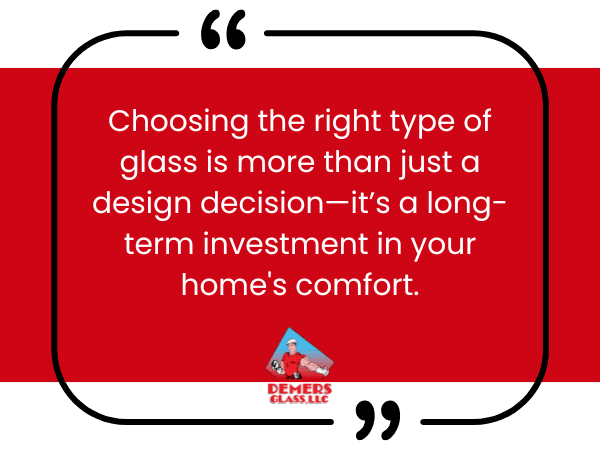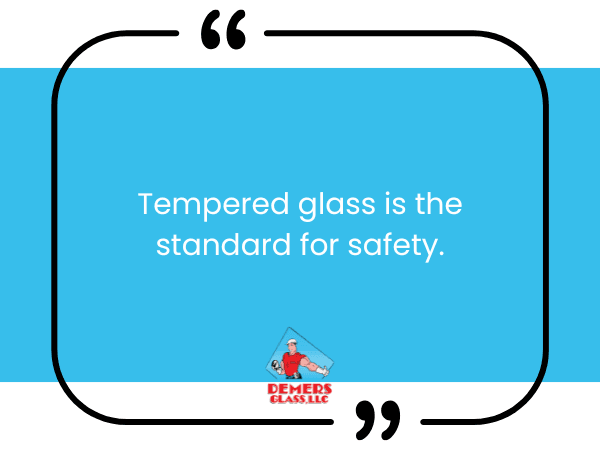Since 1977, Demers Glass has proudly served Arizona homeowners with high-quality glass solutions built to last. Whether you're exploring replacement windows or designing your dream home from scratch, energy efficiency, and safety.

In this comprehensive guide, we address the most common questions our customers ask about residential window glass. We aim to simplify your decision-making by providing clear, practical insights from decades of experience.
Why Is Choosing the Right Glass So Important?
Glass is a foundational element in modern homes. Beyond allowing natural light in, it influences:
- Energy usage
- Interior comfort
- Noise levels
- Security
- Visual appeal
With today's innovations, you’re no longer limited to a single glass type. From UV-blocking coatings to gas-filled triple-pane units, there’s a perfect glass for every need and climate. Our team at Demers Glass helps customers identify these options every day, and we're here to share what you need to know.
What Are the Main Types of Glass Used in Home Windows?
Home windows are available in a variety of glass types, each designed for specific performance benefits. Here’s a breakdown:
1. Annealed Glass
This is the most basic type of window glass and is typically used where safety isn’t a major concern. It’s less expensive but can shatter into sharp pieces when broken.
2. Tempered Glass
Also known as safety glass, tempered glass is heat-treated for increased strength. It breaks into small, blunt fragments, reducing the risk of injury. It's commonly used in locations that require enhanced safety, such as near floors or in shower enclosures. Learn how it compares to other types in our guide to ceramic vs. tempered glass.
3. Laminated Glass
Made by bonding two or more glass panes with a durable plastic interlayer, laminated glass holds together when shattered. It provides excellent sound insulation, improved security, and UV protection. It's often used in hurricane zones or homes where break-ins are a concern.
4. Low-E Glass (Low Emissivity)
Low-E glass has an ultra-thin, invisible coating that reflects heat and filters UV rays while allowing natural light in. It helps regulate indoor temperature, lowers energy bills, and protects interior furnishings from sun damage.
5. Insulated Glass Units (IGUs)
An IGU consists of two or three panes of glass separated by a spacer and sealed with gas fills like argon or krypton. This construction significantly enhances thermal insulation. Curious about how these work? Explore our detailed post on insulated glass pros and cons.
Which Glass Options Are Best for Energy Efficiency?
If energy savings are a top priority, Low-E glass paired with argon-filled double- or triple-pane windows is your best bet. According to the U.S. Department of Energy, energy-efficient windows can cut heating and cooling costs by 12% or more.
Look for windows with:
- Double or triple glazing
- Low-E coatings
- Inert gas fills (argon or krypton)
- Warm-edge spacers to minimize thermal bridging
Our blog on how to choose energy-efficient windows offers a full walkthrough.
What’s the Best Glass for Arizona’s Climate?
Arizona homes face intense heat and sunlight. To protect your interiors and reduce cooling costs, homeowners should look for glass with a low Solar Heat Gain Coefficient (SHGC) and strong UV-blocking capabilities.
Triple-pane windows may be excessive for Arizona’s winters, but advanced Low-E coatings and insulated glass units are ideal for our region. Want a deeper look at climate-specific options? See our Arizona-specific window replacement guide.
Is Noise Reduction Important? Which Glass Performs Best?
For homes near busy roads or in high-traffic areas, noise-reducing glass improves quality of life. Consider:
- Laminated glass: Reduces sound transmission by dampening vibrations.
- Triple-pane windows: The additional layer of glass and insulating gas further blocks noise.
If sound control is critical, consult our whole-house replacement guide to ensure every room benefits.
Are There Glass Options That Improve Privacy?
Absolutely. Several types of specialty glass provide privacy while still allowing light in:
- Frosted Glass
- Textured Glass
- Tinted Glass
For example, we often recommend privacy-enhancing glass for bathrooms, entryways, or offices. Pair this with residential window tinting to further control visibility and sunlight.
What About Window Safety?
Homeowners with children or large pets should prioritize safety glass, especially in low windows or high-traffic areas.

Laminated glass offers additional protection from impacts and storms.
Homes with older glass should consider replacement to meet today’s safety standards. Tempered vs. ceramic glass is a helpful comparison for choosing the right material in high-heat or impact-prone areas.
How Do I Know If Triple-Pane Glass Is Worth It?
Triple-pane windows offer:
- Superior insulation
- Better noise control
- Reduced condensation
While more expensive, they’re worth it for colder regions or homeowners who want the best comfort and efficiency. If you live in the northern parts of Arizona, read our guide to the best windows for cold climates.
How Should I Maintain My Glass Windows?
Well-maintained windows can last for decades. Here’s how to keep them in top shape:
- Clean glass regularly with non-abrasive cleaners.
- Inspect seals annually to avoid fogging or gas leakage.
- Replace damaged or broken panes promptly to retain energy efficiency.
For expert tips on identifying wear or deciding between repair and replacement, see our window glass replacement guide.
Summary Table: Which Glass Is Right for You?
Why Trust Demers Glass?
We’ve proudly served homeowners since 1977, helping thousands of families improve their homes with custom glass solutions. With a reputation built on trust, quality, and long-term service, we’re more than just installers we’re partners in enhancing your space.
Whether you’re selecting energy-efficient glass for the first time or replacing old windows in a historic home, our team is here to help every step of the way.
Related Articles You May Find Helpful
- Pella vs Andersen Windows: Your Ultimate Resource
- What Is Insulated Glass? Reviewing the Pros and Cons
- Everything You Need to Know About Whole-House Window Replacement
- Types of Windows: A New and Replacement Window Guide
Ready to Upgrade? Let's Talk.
If you're considering replacing or upgrading your home's window glass, let Demers Glass provide a personalized solution that fits your budget, climate, and lifestyle. Contact us today to speak with one of our window specialists.
